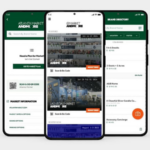Pohmer On…What’s Your Favorite Future?
Luck is something that all of us need in life, whether it is in business or personal life. Luck was the opportune moment I met my wife of almost 29 years. Was it a planned occurrence? Absolutely not, it was purely happenchance (and definitely a very lucky happenchance for me, but maybe not in my wife’s mind if you have the courage to ask her about it!). Luck is finding that $20 bill in the parking lot at the mall with no one else around to lay claim to it. Luck is getting off a tumultuous plane ride after bouncing around the skies for hours and seeing a brilliant rainbow stretching across the heavens.
Luck is coincidentally being in the right place at the right time. We all need a bit of serendipity, the gift of finding valuable and agreeable things not sought for, to make our lives a bit more enjoyable, productive and spontaneously gratifying. But can we plan our futures based on the hope that luck will intervene at our convenience? Can we plan our future on the hope that luck will always be evident when we need it most?
Is It Really Luck?
How many times have we heard the comment, “I’d rather be lucky than smart or good?” We’re constantly reminded in the business journals about the guy who stumbles across the next big idea and converts it to millions or about the company that grows by leaps and bounds because a new interstate is built, resulting in an influx of new housing and an instant customer base.
Was this luck or was it really the result of long-term thinking and planning and the ability to anticipate the future? Yes, we all deserve and desire just a little (or a lot) of luck in our lives, but can we really rely on that happening, especially when we need it most? Can we be successful just walking down the path of life waiting for luck to show itself and determine the road we take?
While we all have examples of how luck or fate have entered our lives unprompted, I’m a firm believer that we can create at least some of our own luck. Some people confuse luck with the vision, foresight and situational awareness that one develops over time to be able to take advantage of the luck or opportunity that presents itself. This awareness allows us to turn luck into success.
I’m reminded of the motivating phrase, “Success is preparation meeting opportunity.” Our experiences, education, training, relationships and attitudes all contribute to our ability to seize unexpected opportunities and make them work, things that others might attribute to simple dumb luck.
We Control Our Destinies
I’m firmly convinced that we can choose our futures and control much of our destinies. True, we operate in a very competitive, challenging and quickly changing world. However, if we simply wait for the business world as we know it to develop and emerge on its own, then all we can do is react to the actions caused by others and external factors over which we have no direct control. While not 100 percent predictable, I believe we can actively set our own directions and create our own future successes and luck. The outcomes might not be exactly what we want, but they will be far better than if we only act on what others dictate to us.
To accomplish this, we have to understand who we are, what world we operate in and where we want to go and then build the vision, strategies, tactics or activities that will enable us to achieve the goals.
In this process, there isn’t any one future you should focus on initially, instead, focus on a list of the possibilities. After the analysis and assessment is completed, you’ll end up focused on the one that is best for you, the one that becomes your favorite over all others, the one you feel most comfortable with and the one you are most passionate about and can focus your efforts on.
You might say what I’m suggesting is no different than writing a business plan with long-term goals. However, the major difference is this process takes the analytics included in the business plan format, assesses the options and allows you to hypothesize your options on where the world will be in the future. It then helps you decide exactly where you want to be when this future comes about. This is an opportunity to develop a vision that, while taking into account the past and present, really prepares you to look at things in a much longer term, unbridled with the operational constraints we normally have with our businesses and lives, one that is usually reactive and moves evolutionarily.
Looking To The Future Start by envisioning what the marketplace will look like five, 10, 15 years down the road. Where will people be living? Will they be in single-family housing or condos? Will the populated areas be urban, suburban or ex-urban? What will the age and income demographics be? Will we still be dealing with an aging population, or will the younger generations be the dominant purchasing forces? How will consumers want to be communicated to and what information will they need? Will TV, radio and newsprint still be important, or will technologies such as the Internet, Podcasts and streaming video, or cell phones become the most important vehicles to communicate with the consumer? What lifestyles and major trends do you anticipate developing?
Where do you see the marketplace heading? What new direction do you see your significant competition going in? Where will the focus of the big box stores be: in product, services or a combination of the two? What alternative shopping methods will be available, such as the Internet? What changes in the distribution and production networks will be evident? In a time-starved world, what services will the consumer demand?
Based on your analysis of all the above, what products, categories, store type and services will be required to satisfy the consumer? What tools, training, staffing or technology will you need to acquire to be the leader in adapting to this new future you see? Who can you start learning from, such as academia, other industries and life experiences to help you gain the insights and abilities you’ll need?
Time To Implement
Can you begin now to implement some of the things you’ll need to be successful in the future, or do you just build up the ideas and wait for the future to arrive to begin rolling out your new concepts and programs in one fell swoop, changing the core and direction of your business?
There are plenty of examples all around us that we say are successful because these people or companies were lucky, just being in the right place at the right time or stumbling on a new idea or concept that made them instant successes. But were they really lucky or did they create their luck by anticipating the future and jumping on opportunities no one else saw. Is it just that they were prepared for the future when it became available and others weren’t? No, you can’t predict the future, but you can be better prepared for it when it arrives. It’s up to you and you alone to create your own future that will make you successful, but a little luck might help, too…


















 Videos
Videos





